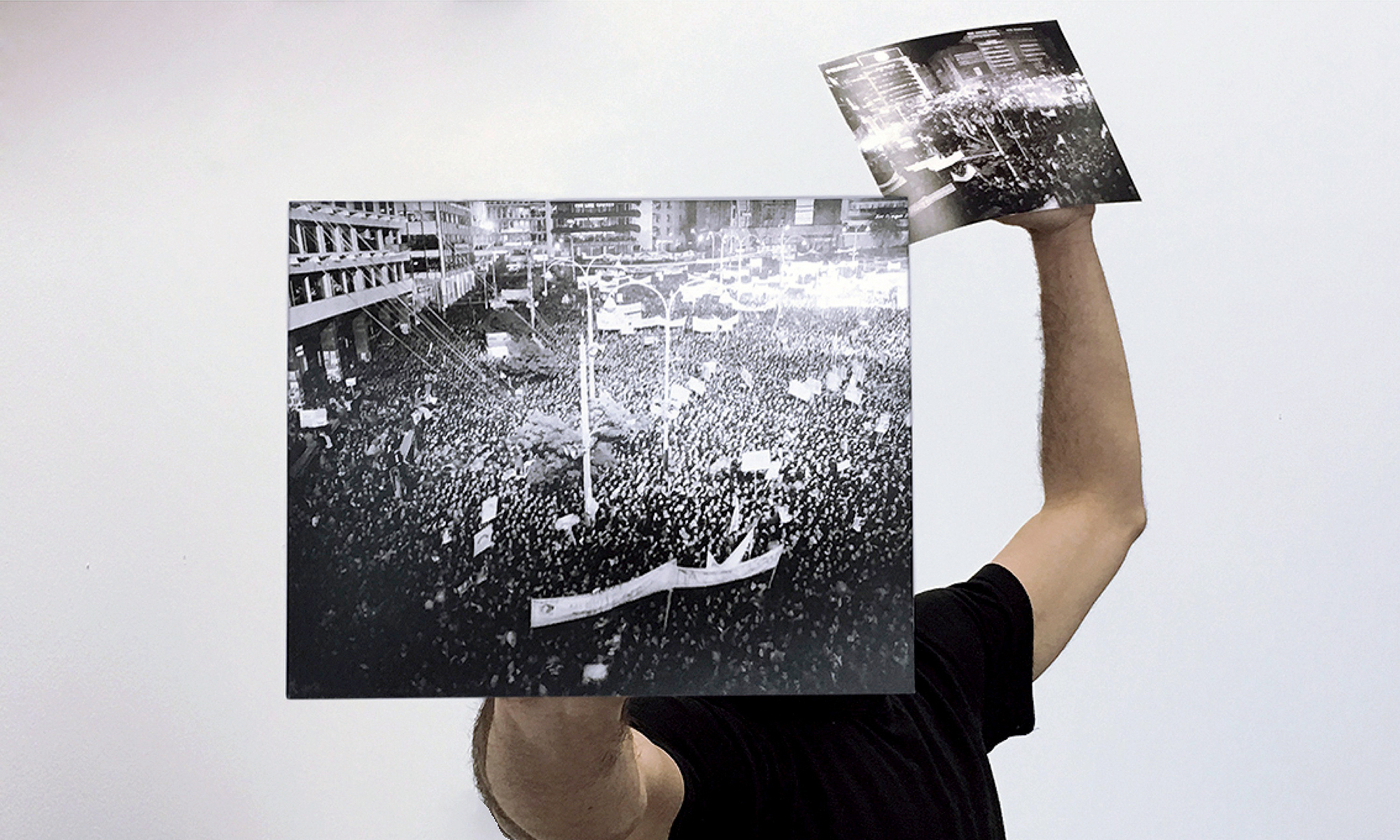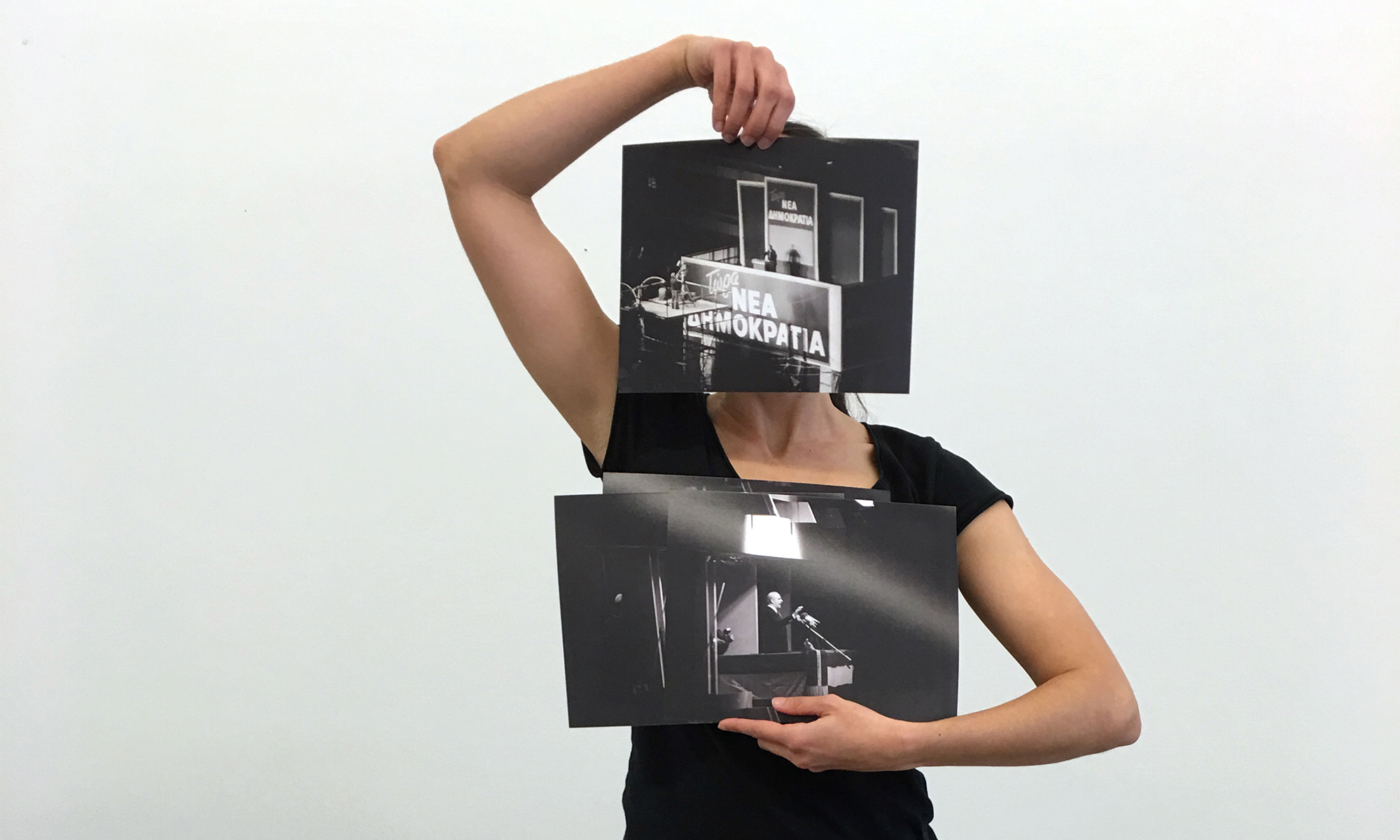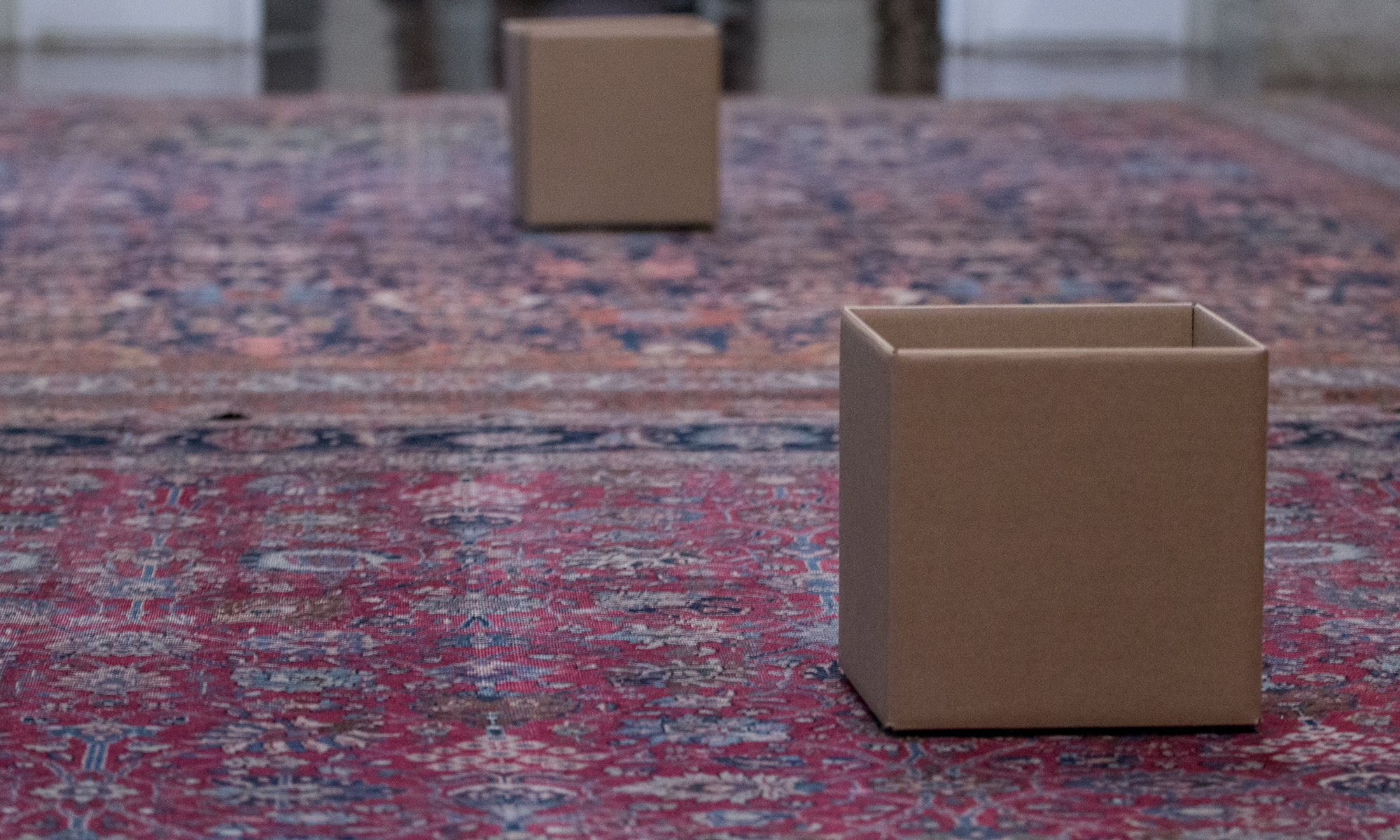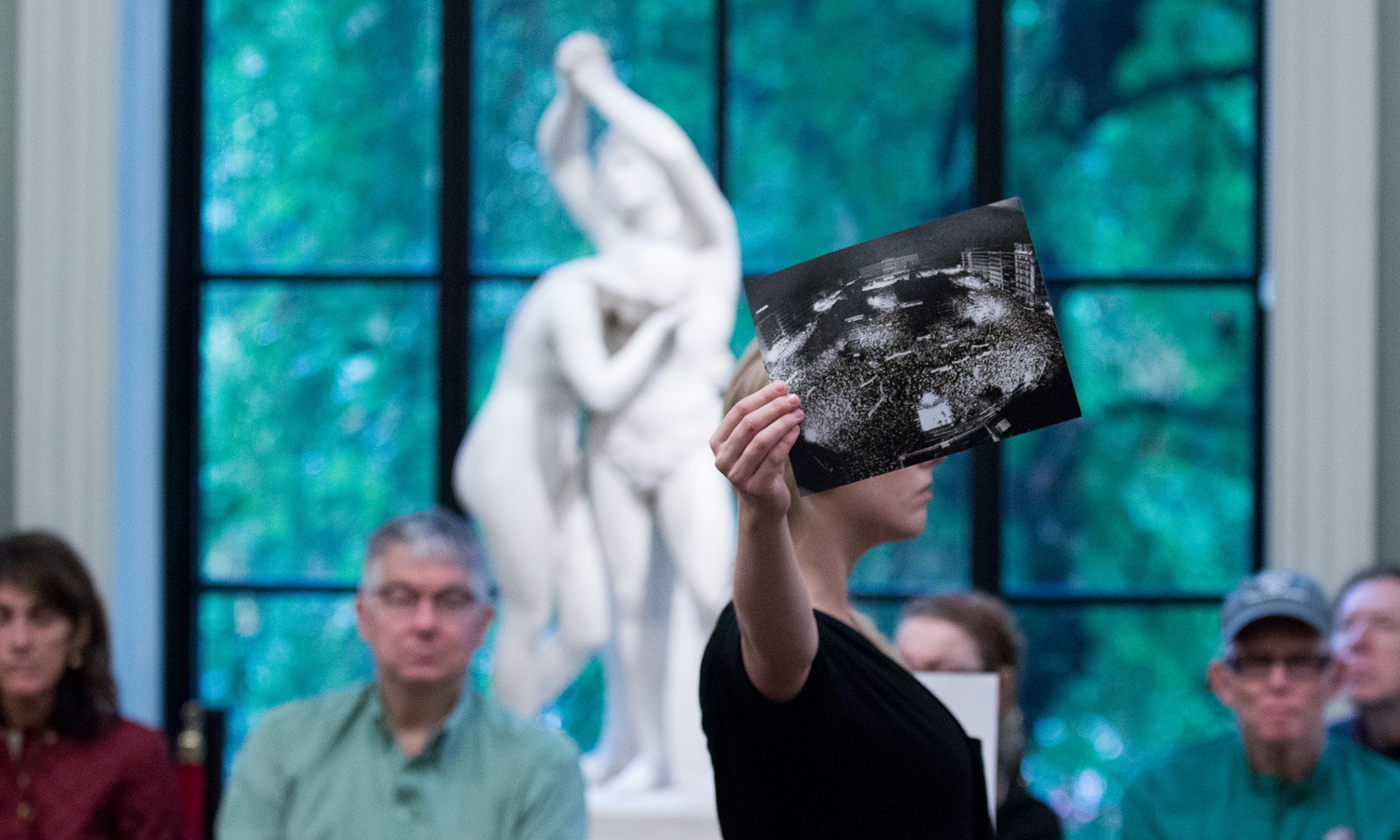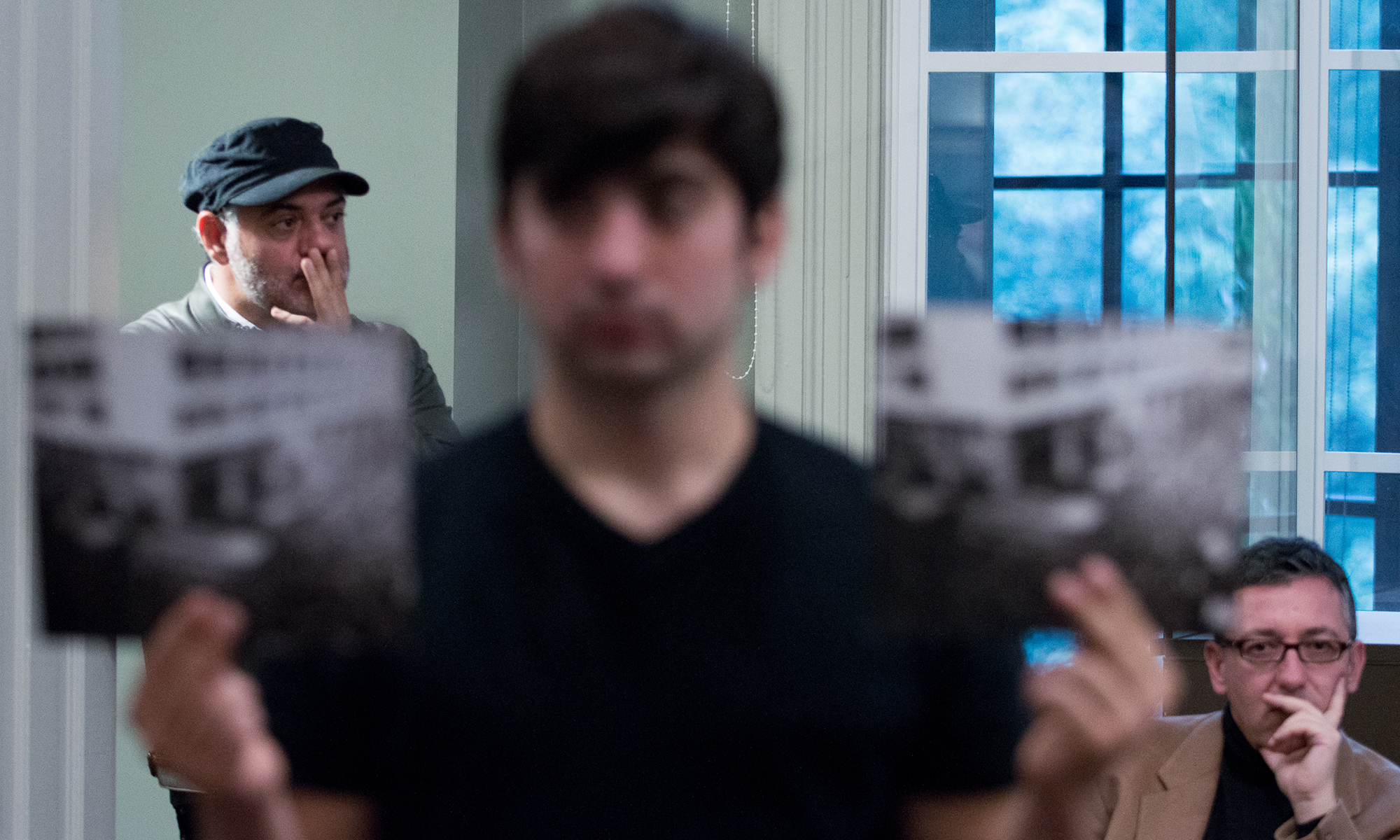The Director of the Arts Administration program at Boston University, Lanfranco Aceti, is proud to announce the premiere in the US, at the Boston Athenaeum, of a new performance of Stefanos Tsivopoulos: One Too Many. As part of ArtWeek Boston, the debut performance in the United States will include a brief post-performance talk about Tsivopoulos’ piece between Professor Lanfranco Aceti and artist Stefanos Tsivopoulos. Tsivopoulos represented Greece at the 55th Venice Biennial. Themes of the artist’s relationship with Greece continue to present in his work, including One Too Many.
During this performance piece, performers intermittently present a series of photographic archives that show crowds of different political rallies from the era of Metapolitefsi in Greece. The Metapolitefsi (Greek: Μεταπολίτευση, translated as “polity/regime change”) was a period in modern Greek history after the fall of the military junta of 1967–74 that includes the transitional period from the fall of the dictatorship to the 1974 legislative elections and the democratic period immediately after these elections. Many consider that the Metapolitefsi ended with the Greece’s entry in the EU and the Euro in 2002.
One of the markers of Metapolitefsi is massive political rallies that took place exclusively in Syntagma Square, Athens. The trend marked a new era of democracy and the official end of the civil conflict, but also solidified populism and corruption in the Greek political system.
For ArtWeek Boston, One Too Many will be performed in the Boston Athenaeum. The location was a deliberate choice, allowing for the juncture of the physical space with the ideological content of Tsivopoulos’ work.
“Tsivopoulos’ performance places within the Boston Athenaeum,” wrote Aceti “a history of a recent past waking up a Greek historical archive and embedding it in the performer’s movements. This work of art, with its subtleties, obliges us to re-think the history of social engagement and the relation between the individual and the masses. In the contemporary political Western climate – which has strained social relations – the definition of populism much bandied about becomes a populistic statement in itself by corrupt partitocracies that have been, particular in Europe, unable to respond to the dismantling of the concepts of state and society without providing sound alternative frameworks. After having transformed politics into a process to dispense handouts, a process particularly visible in the Mediterranean, and not as a framework of social participation, now the lack of goods to be handed out due to the prolonging of the economic crisis is showing the fraying of the fabric of society. Emptied of a social vision, society manifests itself in individual’s gestures of immolation and rejection or in mass movements of anger and rejection. This strikingly simple performance of Tsivopoulos, using as a starting point the recent history of Greece and its turmoils, offers a moment of reflection on the relation between the individual, history, archive and the transformation of social structures in a moment in which it all seems to blend in the hypnotic visions presented by old and new charlatans. The body – in Tsivopoulos’ work of art – becomes the breathing history of archives which through broken movement and partial knowledge offers to the viewer, with a mere glimpse, the illusion that there may be an explanation and a solution hidden somewhere awaiting to be discovered.”
One Too Many by Stefanos Tsivopoulos will debut Saturday October 1, 2016, from 01:00 pm to 2:00 pm at the Boston Athenaeum 10½ Beacon Street, Boston, Massachusetts 02108. The event is free and open to the public.
This event is supported by the Museum of Contemporary Cuts. The Master Lecture by Stefanos Tsivopoulos, part of THE SOCIAL conference, is supported by the Boston University Center for the Humanities.
This performance is part of THE SOCIAL, the International Biennial Conference of Visual Culture. The conference and its programs of events are free for speakers and attendees. If you wish to join the conference please register here. The program of THE SOCIAL can be accessed here.
If you wish to support the Museum of Contemporary Cuts and its art programs we have a Kickstarter for the artworks at this link.
Image credit: Stefanos Tsivopoulos, One Too Many, 2016. Courtesy the artist and Kalfayan Galleries, Athens – Thessaloniki.
Stefanos Tsivopoulos (Gr/NL), is living and working between Amsterdam, Athens and New York.
His works often result from a long-term research into historical films and photographic archives, and are typified by a poetic cinematic language and the use of allegoric narratives. Tsivopoulos’ art practice is driven by an interest in the social, political and economic aspects that determine the production and use of images in the mediated world we live in. His films are presented extensively in both art museums and film festivals around the world. In 2013, he represented Greece in the 55th Venice Biennial with his multifaceted video installation History Zero.
Recent solo shows include: History Zero, MuCEM, Museum of Civilizations of Europe and the Mediterranean, Marseille; History Zero, Center of Contemporary Art State Museum, Thessaloniki; History Zero, Museum of Cycladic Art, Athens (2014); History Zero, Greek Pavilion, 55th International Exhibition La Biennale di Venezia; History Zero, Stella Art Foundation, Moscow (2013); The Future Starts Here, Aischylia Festival, Elefsina (2012); The Blind Image, ISCP, New York (2011); Amnesialand, Heidelberg Kunstverein; The Real The Story The Storyteller, Smart Project Space, Amsterdam (2010); The Real The Story The Storyteller, Museum of Contemporary Art, Belgrade (2009).
A selection of group exhibitions include: Unstated (or, Living Without Approval), BAK, Utrecht; PIGS, Artium, Vittoria-Gasteiz; Indecision, MOANA, Perth International Arts Festival, Perth; Hacking Habitat, Foundation Niet Normaal, Utrecht; (2016); Europe-The Future of History, Kunsthaus Zurich; The Beast and The Sovereign, MACBA, Barcelona; A Brief History of the Human Kind, Jerusalem Museum; 7 Places 7 Precarious Fields, Fotofestival, Kunsthalle Meinheimm; What is to Come Has Already arrived, MUSAC de Castilla y Leon; Prophetia, Juan Miro Foundation, Barcelona (2015); TV as Material 3: The Television Studio, Tate Modern, London; The Invisible Hand: Curating as Gesture, 2nd CAFAM Biennial, Beijing; Hans im Gluck – Kunst & Kapital, Lehmbruck Museum, Duisburg; Agitationism, EVA Biennial, Limerick; What is to Come Has Already Arrived, Centro Andaluz de Arte Contemporáneo, Seville; UHF42, APEXART NY, Wattan TV Ramallah (2014); Ici, Ailleurs, Friche la Belle de Mai, Marseille; Rencontres Internationales, Paris/Berlin/Mardid, Haus Der Culturen Der Welt, Berlin (2013); Extraction, The Penzance Convention, Cornwall; Scramble for History, SALT, Istanbul; Anatomy of Integration, 4th Sculpture Quadrennial Riga (2012); The Rest is History, Manifesta 8, Murcia; On Morality-Act III, Witte de With, Rotterdam; Practicing Memory, Fondazione Pistoletto, Biella; FAQ Serbia, Austrian Cultural Forum, New York; Hors Pistes-Un Autre Mouvement des images, Centre Pompidou, Paris (2010); Reading the city, EVA Biennial Limerick; Monument To Transformation, City Gallery, Prague; The First Image, CRAC LR Art Center, Sète; One Giant Leap, BFI Southbank, London (2009); Salon of the Revolution,HDLU October Salon, Zagreb; Mourmouring images, Centre Photographique d’Ile de France, Paris; Revolution I love you, Trafo Gallery, Budapest; Monitoring, Friedericianum, Kassel (2008); In Present Tense, Museum of Contemporary Art, Athens; Destroy Athens, 1st Athens Biennale (2007).

